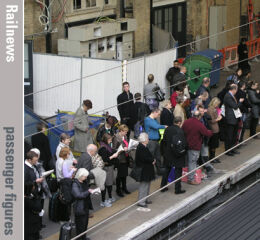Posted 4th November 2022 | No Comments
Passenger figures continue to recover since Covid

The number of people travelling on National Rail and the London Underground is continuing to rise, with the demand over some weekends greater than it was before the Covid lockdowns.
The quietest day of the week is Monday, with more commuters travelling on Tuesdays, Wednesdays and Thursdays. There are also fewer commuters on Fridays, but their absence is offset by the increasing number of people travelling for leisure purposes on a day which is increasingly seen as the start of the weekend.
On London Underground there were 78 per cent of pre-Covid passengers in the week ending 28 October, reports the Times. The figures for the start of September were 71 per cent, compared with 45 per cent in January. At the weekends passenger travel is back to more than 90 per cent and sometimes more than before the lockdowns.
On National Rail the recovery is also continuing, and as on the Underground the quietest days of the week for commuters are Mondays and Fridays. Network Rail says the number of National Rail passengers in the London area is back to 99 per cent of pre-Covid levels.
Again, Fridays are busy, but mainly because of the large numbers of leisure travellers rather than commuters.
The news on revenue is not quite so rosy, because fewer passengers are travelling on First Class tickets or buying classic seasons. It is not clear how successful the new ‘flexible’ seasons have proved to be.
Southeastern reported recently that the number of its passengers now holding full-time seasons has fallen back to 15 per cent of commuters. It is also abolishing First Class on its mainline trains, reflecting the change in travel habits and releasing more seats for other passengers.
The increases are being recorded in spite of repeated industrial action this year. A strike is disrupting West Midlands Railway services today, and it will be followed by a series of more general strikes from tomorrow.
